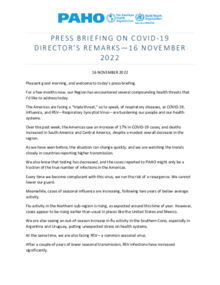Press Briefing on COVID-19: Director's Opening Remarks, November 16, 2022

|
Pleasant good morning, and welcome to today’s press briefing. For a few months now, our Region has encountered several compounding health threats that I’d like to address today. The Americas are facing a “triple threat,” so to speak, of respiratory diseases, as COVID-19, Influenza, and RSV—Respiratory Syncytial Virus—are burdening our people and our health systems. Over the past week, the Americas saw an increase of 17% in COVID-19 cases, and deaths increased in South America and Central America, despite a modest overall decrease in the region. As we have seen before, the situation can change quickly, and we are watching the trends closely in countries reporting higher transmission. We also know that testing has decreased, and the cases reported to PAHO might only be a fraction of the true number of infections in the Americas. Every time we become complacent with this virus, we run the risk of a resurgence. We cannot lower our guard. Meanwhile, cases of seasonal influenza are increasing, following two years of below-average activity. Flu activity in the Northern sub-region is rising, as expected around this time of year. However, cases appear to be rising earlier than usual in places like the United States and Mexico. We are also seeing an out-of-season increase in flu activity in the Southern Cone, especially in Argentina and Uruguay, putting unexpected stress on health systems. At the same time, we are also facing RSV—a common seasonal virus. After a couple of years of lower seasonal transmission, RSV infections have increased significantly. High RSV activity is burdening health systems in Canada, Mexico, Brazil, Uruguay and the United States, and some pediatric hospitals are reaching capacity as a result of this surge. Unfortunately, RSV has a great impact on the most vulnerable among us: our children, and particularly infants under one year old. The rise of a single respiratory infection is a cause for concern. When two or three start impacting a population concurrently, this should put us all on alert. Encouragingly, the strategies we use to limit the spread of COVID-19, like masking and social distancing, also apply to these other respiratory diseases, and can continue to be used to help communities keep safe. Health authorities should encourage these practices anytime respiratory infections rise in their country. This is our best option for RSV, a disease that does not yet have a licensed vaccine. But we are fortunate to have effective vaccines against the flu and COVID-19. Yet, October saw another decline in the number of people completing their primary series of vaccination against COVID-19, and the number of administered boosters has also fallen. PAHO continues to procure vaccines for Member States through the Revolving Fund. This year we have provided 39.5 million vaccine doses against COVID-19, and 31 million flu vaccines to countries in our region. We have enough vaccines to keep us all safe. Please, let’s use them! Countries should also strengthen genomic surveillance, along with disease surveillance more broadly, to ensure that we can address each of these viral infections appropriately. Let’s remember, a health threat in any of our countries is a health threat to the Region, and we must share this information to face it together. Before I close, I want to briefly address additional outbreaks that are ongoing in the Americas. First, the cholera situation in Haiti continues to worsen. Health authorities have confirmed over 700 cases since early October and are investigating more than 7,000 suspected cases. So far, 144 cholera patients in the country have died during this outbreak. This is a dangerous situation, and PAHO urges all countries to increase vigilance, while we support Haiti in providing life-saving care to patients, deploying health workers, and facilitating access to fuel for health facilities. Second, although the Americas are still the Region most impacted by monkeypox, cases have fallen in most of the severely affected countries. We must take advantage of this momentum to drive monkeypox cases to zero as quickly as possible. To successfully reduce transmission and treat existing cases, governments must continue to proactively engage with those who are most at risk, primarily men who have sex with men. Finally, on polio, no further cases have been reported in the region, but vaccination remains at historically low levels. Countries must offer catch-up vaccinations for polio to all eligible children immediately. We must remember that polio spreads silently, and it has no cure or treatment. Vaccines are our best tool to prevent this disease. It took us decades to eliminate polio from the Americas. We will not and must not give up now. As we head into the holiday season and travel to celebrate with family and friends, we must be especially vigilant about all of these health threats we spoke about earlier. There are two key lessons from the COVID-19 pandemic that will serve us well today: The first one: we are not powerless. The last few years have demonstrated that our many tools and resources will help us limit the impact of severe respiratory diseases, as long as we use them. Two: our health is interconnected. We must continue to respond to these crises together as a Region, using every opportunity to collaborate and sharing information across borders. Let’s not take these lessons for granted. Thank you. |
